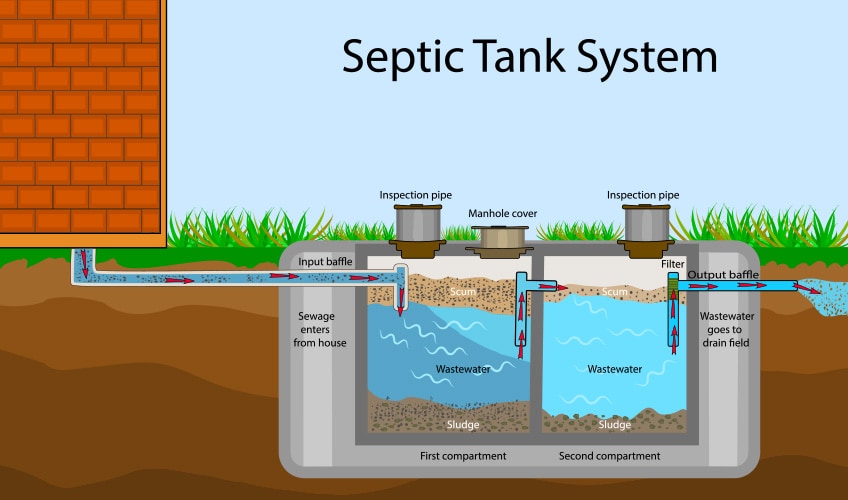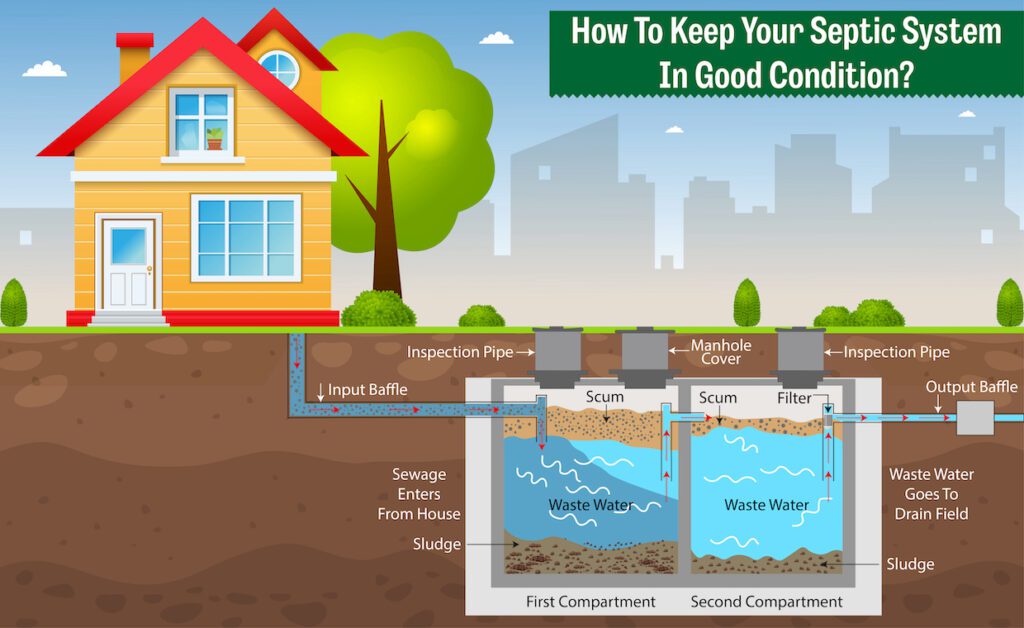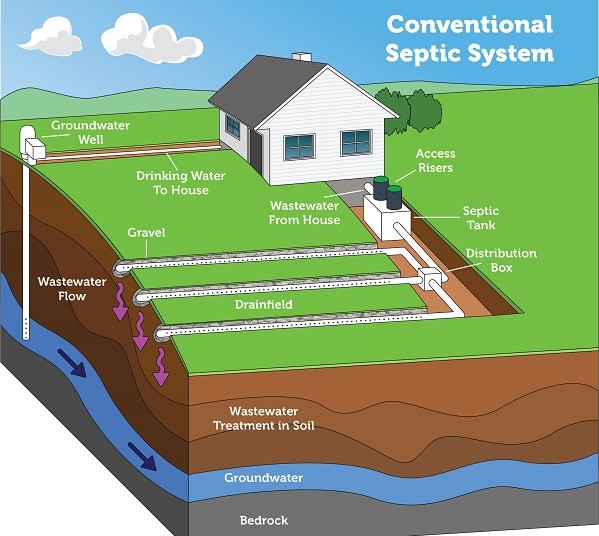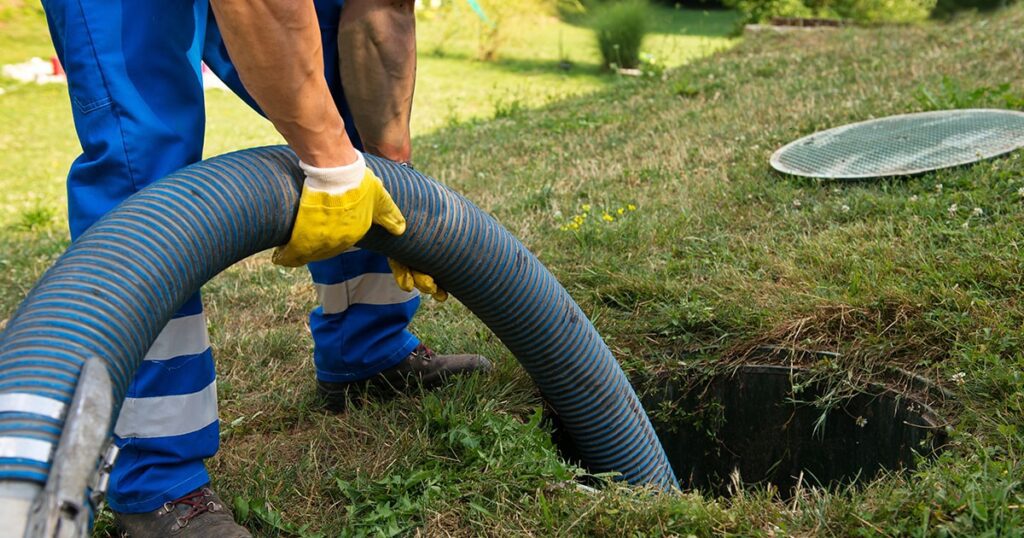In this article, we will discuss the importance of cleaning your septic tank and how often it should be done to ensure optimal waste removal. A septic tank is a crucial part of your home’s wastewater treatment system, and regular maintenance is essential. We will explore the factors that determine the frequency of cleaning and provide some guidelines to help you make an informed decision. By the end of this article, you will have a better understanding of when and how often you should have your septic tank cleaned to ensure its efficient functioning.

Understanding the importance of septic tank cleaning
Having a septic tank on your property comes with the responsibility of regular maintenance and cleaning. While it may not be the most glamorous topic, understanding the importance of septic tank cleaning is crucial for the longevity and efficiency of your septic system. By properly maintaining your septic tank and ensuring optimal waste removal, you can prevent potentially costly and hazardous situations. In this article, we’ll explore how a septic tank works, why regular cleaning is necessary, and the consequences of infrequent or inadequate cleaning.
How does a septic tank work?
Before delving into the importance of septic tank cleaning, it’s important to understand how a septic tank functions. A septic tank is an underground wastewater treatment system that is commonly used in rural areas or properties that are not connected to a public sewage system. It consists of a large tank made of concrete, fiberglass, or plastic, which is divided into two compartments.
When wastewater enters the septic tank from your household, it undergoes a series of natural processes. The solid waste settles to the bottom of the tank and forms a layer of sludge, while the liquids float to the top and create a layer of scum. The remaining liquid, known as effluent, flows out of the tank and into the drain field, where it percolates through the soil, eventually being filtered and treated by the natural processes of the environment.
Why is regular septic tank cleaning necessary?
Over time, the solid waste in the septic tank accumulates, and if not properly maintained, it can lead to a variety of issues. Regular septic tank cleaning is necessary to remove the buildup of sludge and scum, ensuring that the tank operates efficiently and effectively. Without regular cleaning, the accumulation of solid waste can lead to clogged drains, foul odors, and even more severe problems, such as system failure and groundwater contamination.
Consequences of infrequent or inadequate septic tank cleaning
Neglecting septic tank cleaning or not cleaning the tank frequently enough can have dire consequences. Without regular cleaning, the buildup of sludge and scum can exceed the capacity of the tank, causing it to overflow or backup. This can result in sewage backups in your household drains, foul odors permeating your property, and the release of harmful bacteria and pathogens into the environment.
Moreover, infrequent or inadequate cleaning can lead to expensive repairs or even the need for a full septic system replacement. The excess accumulation of solid waste can clog the drain field, preventing the effluent from properly percolating through the soil. This can cause backups, water pooling on the surface, and the contamination of nearby bodies of water.
Factors to consider for septic tank cleaning frequency
The frequency at which you should have your septic tank cleaned depends on various factors. By taking these factors into consideration, you can determine the optimal cleaning frequency for your specific situation.
Average household wastewater production
One of the primary factors to consider is the average amount of wastewater your household produces. Larger households with more occupants will naturally generate more wastewater, resulting in a higher accumulation of solid waste in the septic tank. The increased wastewater production may require more frequent cleaning to prevent overloading the tank.
Tank size and capacity
The size and capacity of your septic tank also play a significant role in determining the cleaning frequency. Smaller tanks may need to be cleaned more often, as they have a lower capacity to store solid waste. Conversely, larger tanks can accommodate more waste and may require less frequent cleaning.
Number of occupants in the house
The number of occupants in your household directly affects the amount of wastewater produced. The more people living in the house, the more wastewater will flow into the septic tank. As a result, households with more occupants may need more frequent cleanings to prevent the tank from reaching its capacity too quickly.
Types and amounts of waste generated
The types and amounts of waste generated in your household can also impact the cleaning frequency. Certain activities, such as excessive use of garbage disposals or frequent use of harsh chemicals, can contribute to the accumulation of solid waste and scum in the septic tank. Additionally, non-biodegradable items, such as wet wipes or feminine hygiene products, can clog the system, requiring more frequent cleanings.
Local regulations and guidelines
Local regulations and guidelines may dictate the required cleaning frequency for septic tanks in your area. It’s important to familiarize yourself with these regulations to ensure compliance and maintain the health and safety of your septic system.
Previous cleaning and maintenance history
The history of previous cleanings and maintenance can also provide insight into the optimal cleaning frequency. If you’ve always had your septic tank cleaned on a regular basis and have not experienced any issues, you can use that history as a guideline. On the other hand, if you’ve neglected cleaning in the past or have encountered problems, it may be necessary to increase the frequency of cleanings.
Recommended septic tank cleaning frequency
Based on the factors mentioned above, there are general guidelines for residential septic tanks, as well as specific recommendations for different household sizes. It’s essential to note that these recommendations should be used as a starting point and may need to be adjusted based on your unique circumstances.
General guidelines for residential septic tanks
In general, residential septic tanks should be cleaned every 3 to 5 years. This timeframe allows for the removal of accumulated sludge and scum before it reaches a critical level. However, it’s important to keep in mind that this is a general recommendation and may not apply to all situations.
Specific recommendations for different household sizes
For households with one or two occupants, septic tank cleaning every 3 to 5 years is typically sufficient. The lower wastewater production from a smaller number of occupants allows for longer intervals between cleanings.
For households with three to five occupants, septic tank cleaning every 2 to 3 years is recommended. The increased wastewater production necessitates more frequent cleanings to prevent overloading the tank.
For households with six or more occupants, septic tank cleaning every 1 to 2 years may be necessary. The higher wastewater production from a larger number of occupants requires more regular maintenance to prevent system failure.
Factors that may necessitate more frequent cleaning
Certain factors may necessitate more frequent septic tank cleanings, regardless of household size. If you have a small septic tank or a tank that does not have a large capacity, you may need to clean it more often. Additionally, if your household generates a significant amount of waste, such as through excessive use of garbage disposals or the disposal of non-biodegradable items, more frequent cleanings may be required.
It’s also important to keep an eye out for any signs that your septic tank needs cleaning. Recognizing these signs can help you avoid potential issues and address them promptly.
Signs that your septic tank needs cleaning
Regular inspections and awareness of the signs that your septic tank needs cleaning are crucial for maintaining a healthy septic system. If you notice any of the following signs, it’s likely time to schedule a professional septic tank cleaning:
Foul odors and sewage smells
If you start to notice unpleasant odors in or around your property, particularly near the drain field, it could indicate a full septic tank. The buildup of solid waste and scum can cause foul odors that permeate your property and can be particularly strong outdoors.
Slow-draining or backed-up drains
If your sinks, toilets, or showers are draining slowly or experiencing frequent backups, it may be a sign that your septic tank is full. The accumulation of solid waste can clog the system, preventing proper drainage and causing backups into your household drains.
Overflow or pooling of water near the drain field
If you notice water pooling on the surface or an overflow of water near the drain field, it may indicate that your septic tank is full or experiencing issues. This can be a sign of a clogged drain field or an overloaded system that requires immediate attention.
Gurgling sounds in plumbing fixtures
Unusual gurgling sounds coming from your plumbing fixtures, such as toilets or drains, can indicate a full or clogged septic tank. The backup of wastewater can create air pockets in the system, causing these gurgling sounds.
Increased frequency of septic system maintenance
If you find yourself needing to have your septic system pumped more frequently, it may be a sign that your septic tank is not being cleaned often enough. Excessive pumping requirements indicate an overloaded system that needs attention.
If you notice any of these signs, it’s crucial to schedule a professional septic tank cleaning as soon as possible to avoid potential damage to the system and ensure optimal waste removal.

Hiring a professional septic tank cleaning service
While some homeowners may attempt to clean their septic tanks themselves, it is generally recommended to hire a professional septic tank cleaning service. Septic tank cleaning is a specialized task that requires knowledge, equipment, and expertise. Professional cleaners have the necessary tools and experience to properly clean and maintain your septic tank. Here are some important considerations when hiring a professional septic tank cleaning service:
Researching and selecting a reputable service provider
Take the time to research and select a reputable septic tank cleaning service in your area. Look for companies with positive reviews, proper licensing, and certifications. Recommendations from friends, neighbors, or local septic system experts can also be valuable in finding a reliable service provider.
The importance of proper disposal and treatment
Ensure that the septic tank cleaning service you choose follows proper disposal and treatment procedures for the waste removed from your tank. The waste should be disposed of legally and in an environmentally responsible manner.
Obtaining cost estimates and service agreements
Before hiring a service provider, obtain cost estimates and inquire about the specifics of their service agreements. Understand what is included in the cleaning service, such as the inspection of components and any additional steps or procedures involved. Clear communication and transparency regarding costs and services will help you make an informed decision.
Scheduling the cleaning appointment
Once you’ve selected a septic tank cleaning service, schedule the cleaning appointment at a convenient time for both parties. Ensure that you are available to supervise and discuss any concerns or questions you may have with the service provider.
Preparing the septic tank and surrounding area for cleaning
Before the cleaning appointment, make sure to prepare the septic tank and the surrounding area. Clear any obstacles that may hinder access to the tank, such as plants or debris. Communicate any specific instructions or concerns you may have to the service provider prior to their arrival.
Steps involved in septic tank cleaning
When you hire a professional septic tank cleaning service, they will typically follow a series of steps to ensure a thorough cleaning and inspection of your septic tank. These steps may vary slightly depending on the service provider and the specific circumstances of your septic system. Here are the general steps typically involved in septic tank cleaning:
Inspection and evaluation of the tank condition
Before starting the cleaning process, the service provider will inspect the condition of your septic tank. They will evaluate the level of sludge and scum buildup, check for any signs of damage or leaks, and assess the overall condition of the tank and its components.
Sludge and debris removal
Using specialized equipment, the service provider will pump out the accumulated sludge and remove any debris that may be present in the tank. This process ensures that the tank is emptied of solid waste, allowing for optimal waste removal and preventing future issues.
Tank rinsing and washing
After the sludge and debris have been removed, the tank will be rinsed and washed thoroughly. This step helps remove any remaining particles and residue, ensuring a clean and functioning septic tank.
Baffle and filter inspection/cleaning
During the cleaning process, the service provider will also inspect and clean the baffles and filters within the septic tank. These components play a crucial role in the proper functioning of the system and should be regularly inspected and maintained.
Outline any additional steps or procedures involved
Depending on the specific circumstances of your septic system, there may be additional steps or procedures involved in the cleaning process. This could include repairs, component replacements, or the use of specialized treatments to address specific issues. The service provider will inform you of any additional steps required and explain the reasoning behind them.

Maintaining a healthy septic system between cleanings
While regular septic tank cleaning is essential, maintaining a healthy septic system between cleanings is equally important. Adopting proper septic system maintenance practices can help prolong the life of your septic tank and prevent problems from occurring. Here are some practices to keep in mind:
Regular inspection of the tank and components
Performing regular inspections of your septic tank and its components can help identify any potential issues before they escalate. Check for signs of leaks, damage, or unusual odors. Inspect the drain field for any signs of water pooling or overgrowth. Keeping an eye on these indicators can help you catch problems early on and prevent costly repairs.
Proper waste disposal practices
Proper waste disposal practices are crucial for the health and efficiency of your septic system. Avoid flushing non-biodegradable items, such as wet wipes, feminine hygiene products, or excessive amounts of toilet paper. Additionally, be mindful of what you pour down the drains. Harsh chemicals, oils, and grease can harm the bacteria within the septic tank that help break down waste.
Conservation of water usage
Conserving water usage is not only beneficial for the environment but also for your septic system. Excessive water usage can overload the septic tank and increase the need for more frequent cleanings. Install water-efficient fixtures, such as low-flow toilets and aerated faucets, and practice water-saving habits, such as fixing leaks promptly and avoiding unnecessary water use.
Avoiding or minimizing the use of harsh chemicals
Harsh chemicals can disrupt the natural bacterial balance within your septic tank and inhibit the breakdown of waste. Avoid using excessive amounts of chemical cleaning products and opt for environmentally friendly alternatives whenever possible. These alternatives are not only safer for your septic system but also for the environment.
Regular pumping of the septic tank
Regular pumping of the septic tank is an essential step in proper septic system maintenance. By scheduling regular cleanings, you prevent the buildup of excessive solid waste and minimize the risk of system failure. Stick to the recommended cleaning frequency based on the factors discussed earlier.
Common misconceptions about septic tank cleaning
There are several misconceptions surrounding septic tank cleaning that are important to address. By dispelling these myths, you can make informed decisions and prioritize the health and functionality of your septic system.
Septic additives that claim to eliminate the need for cleaning
Some septic tank additives claim to eliminate the need for regular cleaning by promoting bacterial growth or breaking down solid waste. However, these additives are not a substitute for proper cleaning and maintenance. While they may aid in the breakdown of waste, regular cleanings are still necessary to remove accumulated sludge and scum.
Frequency based on tank additives
Using septic tank additives should not determine the frequency of cleaning. The recommended cleaning frequency should be based on the factors discussed earlier, such as household size, wastewater production, and tank capacity. Septic tank additives should be viewed as a supplement to regular cleaning, rather than a replacement.
The DIY myth: Pros and cons of self-cleaning attempts
Some homeowners may attempt to clean their septic tanks themselves to save money. While this may seem like a cost-effective option, it comes with several risks and disadvantages. Septic tank cleaning involves specialized equipment and knowledge to ensure a thorough and safe cleaning. Without the proper training and experience, self-cleaning attempts can lead to damage to the tank or injury to the homeowner. It is generally recommended to hire a professional septic tank cleaning service for optimal results.
Long-lasting effects of neglecting septic tank maintenance
Neglecting septic tank maintenance, including regular cleanings, can have long-lasting effects on your septic system. The accumulation of solid waste can lead to system failure, groundwater contamination, and costly repairs. Additionally, neglecting maintenance may void warranties or insurance coverage on your septic system, leaving you financially responsible for any damage or repairs that may occur.

FAQs about septic tank cleaning
To further address common concerns and questions regarding septic tank cleaning, here are some frequently asked questions and their answers:
Can I clean my septic tank myself?
While it is technically possible to clean your septic tank yourself, it is generally not recommended. Septic tank cleaning requires expertise, specialized equipment, and an understanding of proper disposal procedures. Hiring a professional septic tank cleaning service ensures a thorough and safe cleaning, minimizing the risk of damage or injury.
What are the consequences of not cleaning my septic tank?
Neglecting septic tank cleaning can lead to a variety of issues, including clogged drains, foul odors, system backups, and groundwater contamination. Additionally, it can result in expensive repairs or the need for a full septic system replacement.
How often should I pump my septic tank?
The recommended pumping frequency depends on various factors, including household size, wastewater production, and tank capacity. As a general guideline, residential septic tanks should be pumped every 3 to 5 years. However, specific recommendations may vary based on your unique circumstances.
What can I do to prevent septic tank problems?
To prevent septic tank problems, adopt proper septic system maintenance practices. This includes regular inspections, proper waste disposal practices, conservation of water usage, avoiding harsh chemicals, and scheduling regular septic tank cleanings.
What happens if my septic tank overflows?
If your septic tank overflows, it can lead to system backups, foul odors, and the release of harmful bacteria and pathogens into the environment. Immediate action should be taken to address the issue, including contacting a professional septic tank cleaning service.
Can septic tank cleaning cause damage to the system?
When performed by a professional service provider, septic tank cleaning should not cause damage to the system. However, improper cleaning techniques or inexperienced individuals attempting to clean the tank themselves can potentially damage the tank or its components. This is why it is important to hire a reputable and experienced septic tank cleaning service.
Should I use septic additives?
The use of septic additives is a personal choice and should not replace regular septic tank cleanings. While some additives may aid in the breakdown of waste, they should be viewed as a supplement to proper maintenance, rather than a replacement for cleaning. Consult with a professional septic tank service provider for recommendations specific to your system.
Conclusion
The importance of regular septic tank cleaning cannot be overstated. By understanding the factors that influence cleaning frequency and recognizing the signs of a full tank, you can ensure optimal waste removal and prevent potentially costly and hazardous situations. Hiring a professional cleaning service and adopting proper septic system maintenance practices are essential for the longevity and efficiency of the system. Prioritizing regular inspections and appropriate waste management practices will help preserve the health and functionality of the septic tank, avoid premature failure, and protect both human and environmental well-being.

